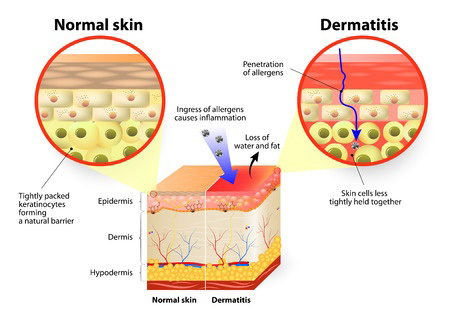Sensitive Skin vs Sensitised Skin
by Lisa Young – Salon Director

If you think you have sensitive skin you may not be alone.
Sensitive skin is on the increase and there are millions of people worldwide that perceive their skin to be sensitive.
Sensitive skin is especially prevalent amongst women and although numbers may vary worldwide and from country to country, statistics show that in Europe, the US and Japan, up to 50% of women and 30% men consider themselves to be sensitive.
But does anyone really understand what type of sensitive skin they actually have ?
There are 2 types of sensitivity in skin and these are :
- Genetically Sensitive Skin.
- Sensitised skin.
By understanding the difference, you are part way to understanding how to treat and control your sensitivity.
Genetically Sensitive Skin
A true sensitive skin condition is genetically sensitive i.e. you were born with sensitive skin.
The key characteristics of someone who has a natural propensity to be sensitive is as follows :
- They blush easily.
- They have a history of asthma.
- They have a history of allergies i.e. hay fever.
When you go for a facial, your skin therapist will use the atopic triangle as an indication of the level of sensitivity. So if you suffer from all or one of the following then you are likely to be more sensitive:
- Hay fever.
- Asthma.
- Eczema.
In addition, genetically sensitive skin tends to be more delicate and fairer due to less pigment in the skin. The epidermis (outer layer of skin) can be thinner and blood vessels are close to the skin surface, which is why the appearance of redness is more obvious.
Sensitised skin
Sensitised skin is a reflection of your environment, lifestyle and physiology. It is on the increase worldwide and therefore driving cosmetic and pharmaceutical companies to develop new skin care products in order to help combat the reactions triggered by these conditions.
Sensitised skin can effect anyone regardless of their genetics and can be caused by the following triggers, which in turn leads to sensitised and inflamed skin :
- Pollution.
- Emotional stress.
- UV light.
- Allergens.
- Hormonal changes.
- Chemicals.
- Smoking.
- Alcohol.
- Poor diet.
- Medical procedures.
- Over-processed or exfoliated skin.
This means absolutely anyone can experience sensitised skin regardless of their skin colour.
How does sensitised skin occur ?
One of the skin’s key functions is to protect the body. It does this via a natural waterproof barrier known as the epidermal lipid barrier layer or barrier function.
Lipids are important to our skin and the way that the barrier or protective function works. When the skin’s natural barrier is damaged, irritants and allergens can penetrate the skin’s barrier. When this happens it causes a reaction to the skin such as itching or redness.
There are a number of inflammatory skin diseases that typically have an impaired barrier function (the reason for which we discuss further on) such as :
- Rosacea.
- Atopic dermatitis.
- Psoriasis.
- Eczema.
There are 2 types of inflammatory responses that can occur in the skin. Typically our immune system is recognised as the key reason to sensitised skin but amazingly the nervous system can also trigger sensitisation and inflammation.
Immunogenic Inflammation
The body’s immune system helps protect it from disease. The inflammatory response is a natural process that removes the irritant and initiates the healing process.
When we see redness and inflammation this is an indication that the body has triggered a number of natural events in the blood vessels, immune system and cells in the skin. The redness we see is an indication that our body is fighting off the invaders.
This means that when the immune system is triggered by a foreign substance such as pollen, microorganisms or an artificial fragrance entering the skin through a break in the skin’s barrier, an immunogenic inflammation response is triggered.
The pain, redness, swelling and heat associated with inflammation, is caused by the white blood cells in the blood stream that rush to the inflamed area to fight off the foreign substance attacking and destroying the invading bacteria, viruses etc.
Neurogenic Inflammation
It is now recognised that inflammation can also be triggered by the nervous system. This is known as Neurogenic Inflammation.
It occurs when an irritant chemical or allergen activates the nerve sensors resulting in the release of substances that trigger an inflammatory response.
Normally these substances play a role in tissue repair. However, they are also found in a variety of painful inflammatory conditions such as:
- Urticaria (itching).
- Psoriasis.
- Atopic dermatitis.
- Hypersensitivity.
- Rosacea.
- Wound healing.
Whilst some of them may instead end the inflammatory process.
In some cases a neurological, emotional and physical stress response can occur causing:
- Skin itchiness.
- Slow healing process.
- Aggravated inflammation.
This means that the everyday stresses at work or home, tight deadlines, toxin build up and even the environment can all be stressors that lead to an increased level of stress hormones causing inflammatory reactions in the body. Just think of the film “There’s Something About Mary” and the guy with the hives Dom “Woogie” Woganowski.
This means its therefore logical that when experiencing redness and inflammation you need to look at the bigger picture of what is triggering the inflammation as it could be a result of either an immunogenic or neurogenic inflammation reaction.
Treating and Coping with sensitised Skin
In summary it is a combination of genetics, immune disruption, nerve activity and epidermal barrier function (or barrier function) that contributes to skin sensitivity and inflammation.
However, not all is lost if you suffer from sensitive or sensitised skin.
An effective combination of the right skincare products and treatments alongside the right lifestyle choices are essential to promoting a healthy skin.
Skincare Ingredients
Some ingredients in high volume consumer cosmetic products can cause sensitised skin. They are commonly used in cheaper high volume product fillers and help to lower the cost of the product for the consumer.
Avoid products with the following ingredients:
- Alcohol.
- Lanolin.
- Fragrance.
- D&C colourants.
Other things you can do to help avoid sensitivity:
Minimise sun exposure
Ensure that you protect your skin on a daily basis. These days SPF30 is a must. Layering SPF rather than relying on 1 product with SPF is more effective than a single SPF product. Stick to the sunbathing rules and when you see any redness on your skin remember it’s telling you something … “get out of the sun”.
Reduce your stress levels
Take time out for yourself and find new ways to cope with daily stress. Getting the right work life balance is key. Taking time out to attend a yoga class or making time for hobbies can help relieve stress. Exercise (even if only a brisk 30 mins walk each day) is great for blowing out the cobwebs and putting the world to rights. There are a variety of relaxing treatments available such as massage and reflexology and many people find that even a manicure can be very relaxing.
Taking care to preserve the skin’s natural protective barrier or barrier function
Treat your skin with respect. Use good products and don’t overdo the exfoliation.
Eat a healthy balanced diet
It’s all about getting the right balance. A low fat diet impairs the barrier function of the skin and puts you more at risk of sensitised skin so leave some healthy fats and oils in your diet and don’t forget your daily allowance of fruit and vegetables and plenty of water. Your skin needs vitamins and hydration to function properly as well as your body.
Dermalogica products are paraben, fragrance and colour free. They contain natural ingredients and the Dermalogica UltraCalming range is designed to treat sensitive and sensitised skins. Studio 8 Beauty stocks a full range of Dermalogica for retail and one of their 3 skincare experts are available for consultation to ensure you get the best product for your skin.
If you would like to discuss and understand your skin with a trained Skincare Professional and see what products are suitable for your skin type why not call the salon and arrange a free consultation with a Dermalogica Skincare Therapist on 023 92 380 692.
Quote of the Day
“A life of reaction is a life of slavery, intellectually and spiritually. One must fight for a life of action, not reaction”
Rita Mae Brown
